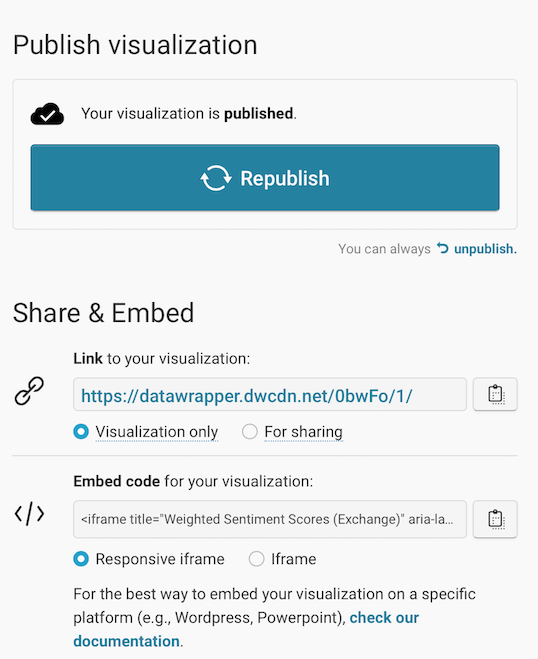Embedding Datawrapper Chart #2 (feat. MDX and Next.js)
Note: This article has been rewritten to reflect necessary code changes in Next.js and MDX from MD in Jekyll.
Recap
Previously, I showed how to embed Datawrapper (opens in a new tab) chart in this article.
I embedded a screenshot of Datawrapper's Publish visualiztion for reference.
Here it is again.

In that article, I recommended using the visualization link rather than the full html tags. However, in case of MDX, it's the other way around. You copy the iframe code and use it to embed the code in MDX. (Choose Responsive iframe radio button)
Datawrapper team recently (literally a few days prior to this writing) released a javascript-based embedding method in place of iframe. However, from my experience, it might break the layout of the MDX page.
Therefore, I'll stick to the iframe-way.
How to embed in MDX, then?
Embedding the code inside MDX on Next.js is a little bit complicated than inside MD on Jekyll.
In the case of Jekyll, I could simply copy that iframe code inside the post.
However, within MDX, it involves a few steps.
- Retrieval of embedding script
- Importing
next/scriptmodule and settingstyleconst variable - Conversion of the
<script>tag into<Script>
Get the embedding script
First obvious step is to get the embedding script from the visualization.
The copied script should look like this (resposive iframe).
<iframe title="Weighted Sentiment Scores (Exchange)" aria-label="Dot Plot" id="datawrapper-chart-0bwFo" src="https://datawrapper.dwcdn.net/0bwFo/1/" scrolling="no" frameborder="0" style="width: 0; min-width: 100% !important; border: none;" height="495"></iframe>
<script type="text/javascript">!function(){"use strict";window.addEventListener("message",(function(e){if(void 0!==e.data["datawrapper-height"]){var t=document.querySelectorAll("iframe");for(var a in e.data["datawrapper-height"])for(var r=0;r<t.length;r++){if(t[r].contentWindow===e.source)t[r].style.height=e.data["datawrapper-height"][a]+"px"}}}))}();
</script>Wait! It's not done yet.
If look closely, this script contains iframe and script tags.
While the first iframe tag needs not be modified (except style property in Next.js), script tag can be simplified.
When it comes to the latter tag, Datawrapper team provides a script src that you can replace instead of this inline script.
<script src="http://datawrapper.dwcdn.net/lib/embed.min.js" />With this replacement, the script becomes
<iframe title="Weighted Sentiment Scores (Exchange)" aria-label="Dot Plot" id="datawrapper-chart-0bwFo" src="https://datawrapper.dwcdn.net/0bwFo/1/" scrolling="no" frameborder="0" style="width: 0; min-width: 100% !important; border: none;" height="495"></iframe>
<script src="http://datawrapper.dwcdn.net/lib/embed.min.js" />Next.js-specific steps
Next.js recommends using Script from next/script in place of traditional script tag.
import Script from 'next/script'Additionally, React.js complains (which is the basis of Next.js) style property set as in string. It needs to be fed with a variable. It also warns about frameborder property preferring frameBorder
export const style = "width: 0; min-width: 100% !important; border: none;";
<iframe title="Weighted Sentiment Scores (Exchange)" aria-label="Dot Plot" id="datawrapper-chart-0bwFo" src="https://datawrapper.dwcdn.net/0bwFo/1/" scrolling="no" frameBorder="0" style={{style}} height="495"></iframe>
<Script src="http://datawrapper.dwcdn.net/lib/embed.min.js" />How is it displayed in action?
Voilà!
Unlike in the Streamlit's Component.iframe() case, the height specification is respected here (As it should be with the fully-working iframe tag).